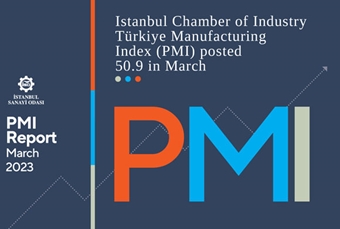News
March 2023 Report of ICI Türkiye Manufacturing PMI and Türkiye Sector PMI Released
- 03.04.2023
- News

The Istanbul Chamber of Industry Türkiye Manufacturing PMI, which is recognized as the fastest and most reliable reference for manufacturing industry performance, the leading indicator of economic growth, increased to 50.9 in March, pointing to a moderate improvement in factory activity compared to the previous month. It is the strongest growth in factory activity since December of 2021.
According to the Istanbul Chamber of Industry Türkiye Manufacturing PMI report, five out of the ten monitored sectors returned to the growth zone in output in March, after a slowdown in February. These sectors include textiles, wood and paper products, machinery and metal products, electrical and electronic products, and land and sea vehicles. The strongest increase was seen in the textile sector, which saw growth for the first time in the last three months. And the most significant decrease was recorded in the food products sector.
The March 2023 results of the Istanbul Chamber of Industry (ISO) Türkiye Manufacturing PMI (Purchasing Managers’ Index) survey, the fastest and reliable reference recognized in manufacturing industry performance was announced. According to the survey results, where any figure greater than 50.0 indicates overall improvement of the sector, the headline PMI rose to 50.9 in March from 50.1 in February, to signal a modest monthly improvement in business conditions in the manufacturing sector. It is the strongest growth in factory activity since December of 2021.
Central to the improvement in the overall health of the sector were renewed expansions in output and new orders during March. Manufacturing production increased for the first time in 16 months. Some firms continued to face disruption as a result of February's earthquake, but others reported having restarted production. Reconstruction efforts in the affected regions also led to higher output in some cases.
New orders, meanwhile, returned to growth for the first time in a year-and-a-half as new business increased solidly over the month. A similar pace of expansion was seen for new export orders, which rose for the first time in a year. Despite the increase in production requirements, employment dipped for the first time in five months, in part due to the earthquake but also as a result of the new early retirement law. Manufacturers remained able to deal with new order inflows and work through outstanding business, but there were some signs of capacity pressures emerging as the rate of depletion in backlogs of work was the softest in 13 months.
Both input costs and output prices rose sharply again in March amid higher raw material costs, currency weakness and increased wages. In both cases, however, the rate of inflation eased from February. Supply-chain disruption also showed signs of easing. There were also signs of supply-chain disruption alleviating. Lead times lengthened for the third month running, but with the amount of earthquake-related disruption easing since February the rate of deterioration in vendor performance was only marginal.
Commenting on the Istanbul Chamber of Industry Turkey Manufacturing PMI survey data, Andrew Harker, Economics Director at S&P Global Market Intelligence, said:
"Renewed output growth in the Turkish manufacturing sector was a welcome development in March following the marked impact of the earthquake in February. Although some firms were still affected, the start of reconstruction efforts supported the overall return to growth. With new orders also up, we are hopefully seeing an end to the relatively soft conditions experienced by firms over the past year or so."
Five out of the monitored ten sectors being monitored returned to growth
According to the Istanbul Chamber of Industry Türkiye Manufacturing PMI report for March, six out of the ten monitored sectors increased their production, and five sectors returned to growth zone after the slowdown observed in February. These sectors include textiles, wood and paper products, machinery and metal products, electrical and electronic products, and land and sea vehicles. The strongest increase was seen in the textile sector, which saw growth for the first time in the last three months. However, even in sectors where production continued to slow down, the declines slowed down compared to the previous month. The most significant decrease was recorded in the food products sector.
Only four of the ten sectors saw an increase in new orders, indicating that developments in demand were not as positive as those in output. The fastest improvement in new orders was seen in the land and sea vehicles sector. This increase, which is the highest since August 2021, also led to an increase in output, employment, purchasing activities, and inventories.
The most significant slowdown in new orders was observed in the chemical, plastic, and rubber products sector, which experienced a decline for the first time in four months.
On the other hand, the pricing power provided by the recovery in demand in the land and sea vehicles sector led to the sharpest increase in final product prices of the last seven months. Apart from the land and sea vehicles sector, the only sector that saw higher inflation rates in final product prices was the clothing and leather goods sector.
In March, input costs inflation slowed down in the majority of sectors. The most significant increase in input prices was in the machinery and metal products sector, while the most moderate increase was in the chemical, plastic, and rubber sector. There were signs of improvement in supply chains, with lead times shortening in the base metal and textile sectors, and milder delays in many other sectors compared to February.
You can find attached the Istanbul Chamber of Industry Türkiye Manufacturing PMI and Sector PMI March 2023 reports.